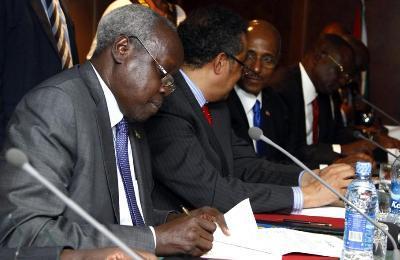S. Sudan’s warring parties make progress on power-sharing deal
December 20, 2014 (ADDIS ABABA) – The two warring parties in South Sudan have made some progress in negotiations, which resumed on Thursday in the Ethiopian capital under the mediation of the regional bloc, the Intergovernmental Authority on Development (IGAD).

South Sudan’s information minister and government’s spokesperson, Michael Makuei Lueth, said the two parties agreed to create 27 ministries for a transitional government.
“So far we have agreed to create 27 ministries with their deputies but had outstanding issues,” he said, adding that there were two ministries and deputies to the prime minister which were not agreed.
Lueth however declined to explain what those two ministries were.
A senior official from the SPLM-IO faction led by former vice-president, Riek Machar, told Sudan Tribune that the parties’ governance and political committee made a breakthrough to give 10% in power-sharing to the former political detainees and other political parties.
The two principal parties were yet to agree on how to divide the remaining 90%.
“On power ratios, we partially agreed that we give G10 and other parties only 10%. We will discuss the 90% for division between the [SPLM]IO and the government tomorrow,” the senior official who preferred anonymity said on Saturday.
He also added that the two parties agreed to adopt and implement a federal system of governance during a 30 months of transitional period which would devolve more powers to states, adding that the two parties were however yet to agree on the name of such a federal government.
The opposition group had suggested it would be called Federal Republic of South Sudan, but the government had been resisting the naming.
The rebels also proposed that the number of states be expanded to more than 20, upgrading old colonial districts.
Other contentious issues also include powers that would be attached to the created executive prime minister.
On security arrangements, the two could not yet agree on whether to maintain two separate armies at least for the period of transition until elections are conducted.
Fighting has raged on from 15 December last year between president Salva Kiir’s government and opposition forces allied to his former deputy, Machar, when what seemed to be a healthy internal political debates on reforms within the ruling party (SPLM) turned violent.
Kiir accused his former colleague of attempting a military coup, which Machar dismissed saying it was a ploy fabricated by the former to silent reformist voices within the party and government.
Tens of thousands of people have died, two million displaced and millions more threatened by hunger and diseases.
The IGAD mediated peace process is the best hope to try to arrest the violence and restore stability in the three-year old nation.
(ST)
